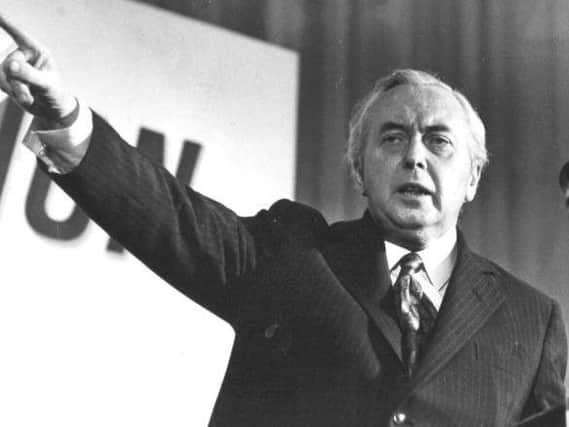Bernard Donoughue: Why Harold Wilson's case for Europe still stands up


Labour had been seriously divided over Edward Heath’s successful 1972 negotiation of entry. A majority of the party in Parliament and in the country were against membership, but a significant minority of MPs voted passionately with Heath, and Roy Jenkins resigned as deputy leader.
Wilson’s immediate priorities were to prevent the party from completely breaking up over Europe, while at the same time keeping it from committing to withdrawal from the EEC in its 1974 election manifesto.
Advertisement
Hide AdAdvertisement
Hide AdAt first Wilson opposed Tony Benn’s suggestion of a referendum as “un-British”. But then he saw it as the lifeboat to steer his way through the election (as Cameron did recently), including a promise to renegotiate better terms of membership.
His priorities, mainly negotiated by Foreign Secretary Jim Callaghan, were typically practical: to secure a better budget settlement for Britain, and to reform the Common Agricultural Policy enabling more access for cheap Commonwealth foods.
Wilson also exploited the rare political device of suspending normal Cabinet collective responsibility with an “Agreement to Differ”.
Of course there were many differences in the political and economic context of the 1975 referendum campaign compared to today. It was then simply a question of remaining in a European free trading community, without the complications of political and monetary union which face the British voter today. Europe was also a strikingly more attractive partner. It had enjoyed two decades of impressive economic growth, presided over by major political leaders such as De Gaulle and Adenauer, guiding Europe into a post-war settlement which bolstered the democratic West against the Soviet Stalinist threat.
Advertisement
Hide AdAdvertisement
Hide AdIn contrast, Britain in 1975 seemed in permanent decline, named “the sick man of Europe”. To many British citizens, Europe seemed the only alternative to sinking into being just America’s dogsbody.
Unsurprisingly, the most weighty politicians supported remaining in the EEC. Prime Minister Wilson and Opposition leader Heath had much greater stature in the country, and internationally, than their equivalents today. Those two had between them won five general elections and been prime minister for a total of 12 years. Their backing for remaining carried great weight and it was no surprise they won with two thirds of the vote.
One striking difference between now and 1975 concerns the style of campaigning. Recent weeks have been depressingly scarred by hostile, extreme and sometimes personal speeches from both sides, mainly within the Conservative Party.
Sadly even the Prime Minister, always a vigorous exponent of his current position, has himself set this adversarial tone. Boris Johnson and others in the Brexit camp have readily countered with seemingly worse excesses. It has been difficult to remember that some of these pugilists are actually members of the same party and government.
Advertisement
Hide AdAdvertisement
Hide AdThis contrasts with 1975. The leading players then contained some feisty opposing politicians, such as Roy Jenkins, Denis Healey, James Callaghan, Barbara Castle, Michael Foot, Tony Benn, Enoch Powell and Edward Heath. Sometimes acrimony broke out, but mainly the campaign was conducted with the relative courtesy and measured arguments.
Wilson played an important role in setting this tone. He was naturally kind and courteous. His approach was agnostic. He never attacked colleagues who disagreed with him.
He was in no way a “Eurofanatic”, as he described Jenkins. Certainly he supported staying in the EEC – telling me the morning after the vote that “pulling out would put the wrong kind of people in power, like Benn and Powell”. (Perhaps today he would feel the same, thinking of Boris Johnson, Nigel Farage and George Galloway).
But he understood the doubts of the exit side, being himself a provincial “Little Englander” who viewed holidays in the Scilly Islands as personally his maximum global exposure. So he supported remaining, but respected those who opposed it.
Advertisement
Hide AdAdvertisement
Hide AdMost important, as a prime minister, Wilson knew that he would have to continue to conduct the Labour Cabinet from the day after the vote as again a collective unity, with the minimum of scars and persisting bitterness. He did so, and that was a tribute to his campaign skills and his career long priority of maintaining party unity.
Afterwards, there were no scores to be settled, no post-referendum reshuffle. It remains to be seen if David Cameron can achieve that healing and renewed Cabinet unity. The signs are not encouraging.
Admittedly his party colleagues – not least Boris Johnson – have not made his task any easier, at times displaying a short-term lack of concern for the longer-term interests of party unity, which must dismay all but their Labour adversaries.
Wilson would have enjoyed observing this mayhem with his wry smile. In 1975 he knew how to conduct matters more astutely.
Advertisement
Hide AdAdvertisement
Hide AdFor myself, as in 1975 (when I was the Prime Minister’s representative on the chief campaign committee), I shall vote to remain even though I have always been a mild Eurosceptic about many matters relating to Brussels – its bureaucracy, lack of accountability and the democratic deficit relating to most polities on the continent.
But on balance, especially concerning areas of diplomatic peace and the social policies affecting working people, Europe is more a force for good than the alternatives that are on offer to us.
Harold Wilson was a political maestro and a Yorkshire pragmatist, without delusions about Europe. He calmly calculated where his party’s, and Britain’s, interests lay: in an imperfect Europe and an imperfect world. Today he would, in my view, take the same undogmatic position.
• Bernard Donoughue was senior policy adviser to prime ministers Harold Wilson and James Callaghan. His latest book, Westminster Diary: Reluctant Minister under Tony Blair, is published this week by ID Taurus, price £25.